Speeches Shim
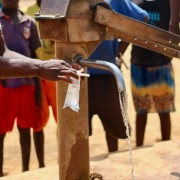
Arbinda commune has experienced some of the worst terrorist attacks in Burkina Faso. Violent Extremist Organizations (VEOs), who grow ever bolder, have now started to strangle this vital community in Sahel region by cutting off water access to the town and conducting deadly attacks, leaving 63 civilians killed by March 2020. Social media videos highlighting the plight of Arbinda's citizens as they struggled to access safe water came to light. The National Office for Water and Sanitation (ONEA), the state water authority charged with providing safe drinking water, has stated that they will not go into Arbinda to repair water points damaged by VEOs until the state can guarantee their engineers' safety. Since the state has shown an insufficient response to the needs of the town’s residents, solutions to VEO influence had to be leveraged from within the community itself.
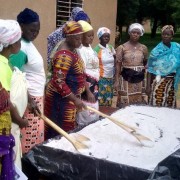
For women in rural Burkina Faso, earning an income and supporting their community is crucial to countering threats from violent extremist organizations (VEOs). Tangaye is a rural commune best known for its peppers, located near the Malian border. Since 2016, VEOs have incited violence and disrupted production and commercial activities in Tangaye. Activities managed by women, such as agriculture, livestock husbandry, and small-scale market gardening are all income-generating activities that have been impacted by the violence.
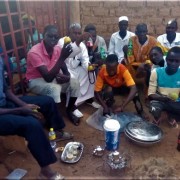
The Tea Grin, or Tea Gatherings, is a long-standing cultural tradition in West Africa where a group of young people meet in the evenings to drink tea and discuss various issues that they face in their daily lives. These forums are places where youth from different neighborhoods can gather to openly discuss stigmitization, exclusion, and xenophobia.
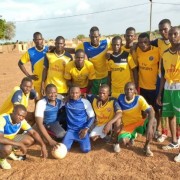
Nestled 22 miles outside the nearest larger town of Dori, Baani is home to seven different ethnic groups. Until the emergence of violent extremist groups, these ethnic groups cohabited peacefully together. Violent extremists have targeted Fulani youth for recruitment and used historical grievances and ethnic marginalization of a minority as techniques to drive a social divide. As a result, newfound clashes between the Fulani and Djawobe communities have erupted, creating instability and fear.
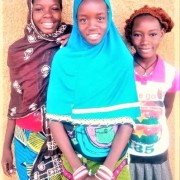
In Ouadalan Province in Burkina Faso, 169 schools, or 87 percent of all schools in that province, have closed due to threats from violent extremist organizations. This includes Déou and Gorom-Gorom, the two largest provincial communities. More than 2,000 students in Déou and approximately 6,000 students in Gorom-Gorom were impacted. In response, USAID/OTI’s Burkina Faso Regional Program partnered with DENAANGU SUKA, a local group, to organize a month-long preparatory and remedial learning course to ensure these students did not fall behind in their studies.

Comment
Make a general inquiry or suggest an improvement.